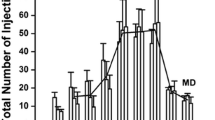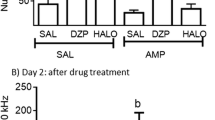Abstract
Two groups of rats were exposed to a fixed-interval 90 s schedule of food reinforcement. One group had access to a drinking tube containing water and the second had access to a running wheel. Amphetamine (0.3–10.0 mg/kg) and scopolamine (0.1–3.0 mg/kg) were assessed for their effects on lever-pressing, adjunctive drinking and adjunctive wheel-running. Low to moderate doses of amphetamine increased overall rates of lever-pressing, whereas the highest dose decreased them. Scopolamine decreased overall lever-pressing rates in a dose-dependent manner. Both drugs changed the within-interval pattern of lever-pressing from one of increasing probability through the interval to almost constant probability throughout. Overall rates of adjunctive drinking and adjunctive wheel-running were decreased by amphetamine and scopolamine. Amphetamine failed to alter the within-interval patterns of either drinking or wheel-running in any substantial manner. The effect of scopolamine was to make the probabilities of each adjunctive behaviour more even through the interval. Although the two drugs had different actions, there was little difference in the way drinking and wheel-running were affected by each.
Similar content being viewed by others
References
Bignami G, Gatti GL (1969) Analysis of drug effects on multiple fixed ratio 33 — fixed interval 5-min in pigeons. Psychopharmacologia 15:310–332
Boren JJ, Navarro AP (1959) The action of atropine, benactyzine, and chlorpromazine upon several operant behaviors. Psychopharmacologia 2:416–424
Branch MN, Gollub LR (1974) A detailed analysis of the effects of d-amphetamine on behavior under fixed-interval schedules. J Exp Anal Behav 21:519–539
Byrd L (1973) Effects of d-amphetamine on schedule-controlled key pressing and drinking in the chimpanzee. J Pharmacol Exp Ther 185:633–641
Dews PB (1958) Studies on behaviour. IV. Stimulant actions of methamphetamine. J Pharmacol Exp Ther 122:137–147
Dews PB, Wenger GR (1977) Rate dependency of the behavioral effects of amphetamine. In: Thompson T, Dews PB (eds) Advances in behavioral pharmacology, vol 1. Academic Press, New York, pp 167–227
Falk JL (1971) The nature and determinants of adjunctive behavior. Physiol Behav 6:577–588
Fry W, Kelleher RT, Cook L (1960) A mathematical index of performance on fixed-interval schedules of reinforcement. J Exp Anal Behav 3:193–199
Herrnstein RJ (1958) Effects of scopolamine on a multiple schedule. J Exp Anal Behav 1:351–358
Kuribara M, Tadokoro S (1982) Changes in schedule-controlled response and schedule-induced drinking after cholinergic blockers in rats. Psychopharmacology 76:251–254
McKim WA (1973) The effect of scopolamine on fixed-interval behavior in the rat. A rate-dependency effect. Psychopharmacologia 32:255–264
Poling A, Krafft K, Chapman L, Lyon D (1980) Polydipsia induced by intermittent delivery of salted liquid foods. J Exp Anal Behav 33:337–344
Roper TJ (1981) What is meant by the term “schedule-induced” and how general is schedule induction? Anim Learn Behav 9:433–440
Roper TJ, Crossland G (1982) Schedule-induced wood-chewing in rats and its dependence on body weight. Anim Learn Behav 10:65–71
Sanger DJ (1976) Scopolamine and adjunctive drinking in rats. Psychopharmacologia 48:307–309
Sanger DJ (1978) The effects of d-amphetamine and scopolamine on drinking induced by a multiple schedule. Psychopharmacology 58:311–315
Sanger DJ, Blackman DE (1978) The effects of drugs on adjunctive behavior. In: Blackman DE, Sanger DJ (eds) Contemporary research in behavioral pharmacology. Plenum Press, New York, pp 239–287
Segal EF, Oden DL, Deadwyler SA (1965) Determinants of polydipsia. V. Effects of amphetamine and pentobarbital. Psychon Sci 3:33–34
Staddon JER (1977) Schedule-induced behavior. In: Honig WK, Staddon JER (eds) Handbook of operant behavior. Prentice-Hall, Englewood Cliffs, NJ
Author information
Authors and Affiliations
Rights and permissions
About this article
Cite this article
Williams, J.L., White, J.M. The effects of amphetamine and scopolamine on adjunctive drinking and wheel-running in rats. Psychopharmacology 82, 360–367 (1984). https://doi.org/10.1007/BF00427686
Received:
Accepted:
Issue Date:
DOI: https://doi.org/10.1007/BF00427686




